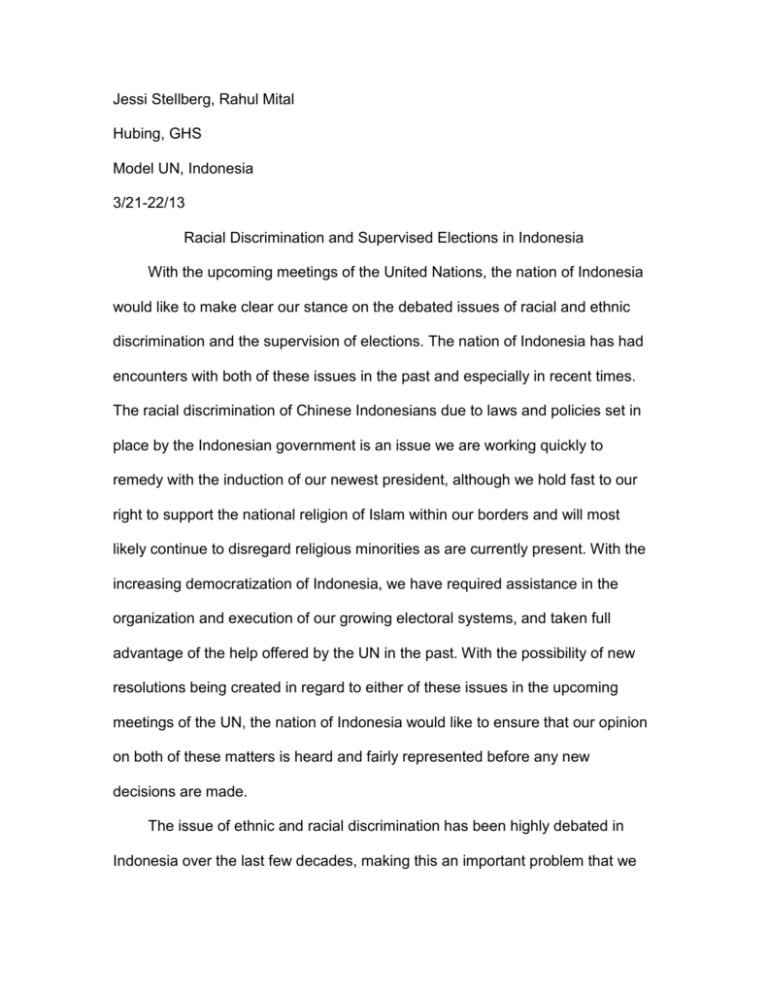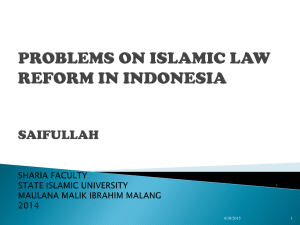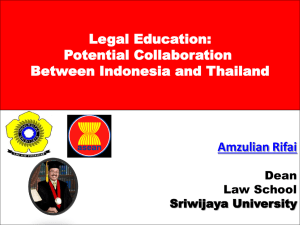Jessi Stellberg, Rahul Mital Hubing, GHS Model UN, Indonesia 3/21
advertisement

Jessi Stellberg, Rahul Mital Hubing, GHS Model UN, Indonesia 3/21-22/13 Racial Discrimination and Supervised Elections in Indonesia With the upcoming meetings of the United Nations, the nation of Indonesia would like to make clear our stance on the debated issues of racial and ethnic discrimination and the supervision of elections. The nation of Indonesia has had encounters with both of these issues in the past and especially in recent times. The racial discrimination of Chinese Indonesians due to laws and policies set in place by the Indonesian government is an issue we are working quickly to remedy with the induction of our newest president, although we hold fast to our right to support the national religion of Islam within our borders and will most likely continue to disregard religious minorities as are currently present. With the increasing democratization of Indonesia, we have required assistance in the organization and execution of our growing electoral systems, and taken full advantage of the help offered by the UN in the past. With the possibility of new resolutions being created in regard to either of these issues in the upcoming meetings of the UN, the nation of Indonesia would like to ensure that our opinion on both of these matters is heard and fairly represented before any new decisions are made. The issue of ethnic and racial discrimination has been highly debated in Indonesia over the last few decades, making this an important problem that we need to take action on. Unfortunately our government has not always been the most accepting of our Chinese-born citizens and have discriminated against them in an effort to keep them out of our country. In addition, these citizens have been the target of many independent riots and attacks in the past, including the riots of May 1998 which killed 6 people and injured one hundred others as shops and homes were burned to the ground and people were beaten down. The event caused the President Suharto to resign and be replaced by the much more progressive Bacharuddin Jusif Habibe. It also created a transition in the types of legislation being passed regarding racial qualification of citizenship, from the harsh policies of the New Order to the more recent, inclusive policies of the reformation. In the later half of the 1900s, the period called the New Order required an SBKRI (letter of proof of citizenship of the Republic of Indonesia) for all citizens of foreign descent when enrolling in universities, military positions, or government jobs, which was unfairly enforced for citizens of Chinese descent, limiting their economic and political opportunities. To attempt to make up for this situation, a reformation period began in the early 2000s that has eliminated the official use of discriminatory terms for these citizens and recalled past legislation that previously forbade the public practice of Chinese culture and language. Since the implementation of these new policies, several prominent government positions have been upheld by Chinese Indonesians on the People’s Representative Council and the Cabinet, showing the progress our country has made. For the future, Indonesia believes that further action by the government should be taken to remove discriminatory legislation and policies against Chinese Indonesians. We also believe that steps should be taken to further their acceptance into Indonesian society, media, and government. We have been called out in the past by the UN for not doing enough to lessen this discrimination, so in the future we would support any resolutions helping to eliminate ethnic prejudice in both our own and in other countries that are currently having similar issues. However, we uphold the right to continue legislation in favor of our national religion of Islam and refuse to comply with the UN’s requests to lessen discrimination of religious minorities, as that is our business only. As the country of Indonesia has attempted to move away from authoritarianism to a system of democracy, the need for supervision of elections has become more important. Over the last ten years or so we have begun to hold voting processes to elect both local and national representatives with the hope for the participation of as many citizens as possible. Since 2006, we have had assistance in this endeavor from the UNDP, which has assisted in both the organization and acquirement of the necessary materials to host a large network of complicated elections for more than 15,000 positions for local representatives in the elections on April 5, 2004, and then again in helping set up the presidential elections held on July 5, 2004 which had 5 separate candidates running for the office. About 585,000 polling stations were required for this undertaking, and the UNDP helped supply them all. The UNDP also helped in voter education and public awareness, which contributed greatly to the 92% turnout for eligible voters. Ensuring that all parts of the population were represented in the new democratic system was an issue of great importance for our government, and we were thoroughly pleased with the results. The UN’s assistance was greatly appreciated, and our success has given us the stance that the UN should offer assistance where requested in supervising elections in newly democratic countries. They should not force their help on unwilling countries however. The country must ask for and fully consent to this assistance first. The nation of Indonesia wishes to express the desire to begin to eliminate racial discrimination within our borders, yet be left alone in matters of religion and rights for religious minorities, and for the assistance in supervising elections where requested in democratically developing countries. Our country is therefore in support of new resolutions as long as they respect the wishes of countries to run themselves as they best see fit, and for the UN’s interference only where requested. As long as these requests are met by the committee, the nation of Indonesia will be more than happy to support any new resolutions put forth for the betterment of democratic nations.






